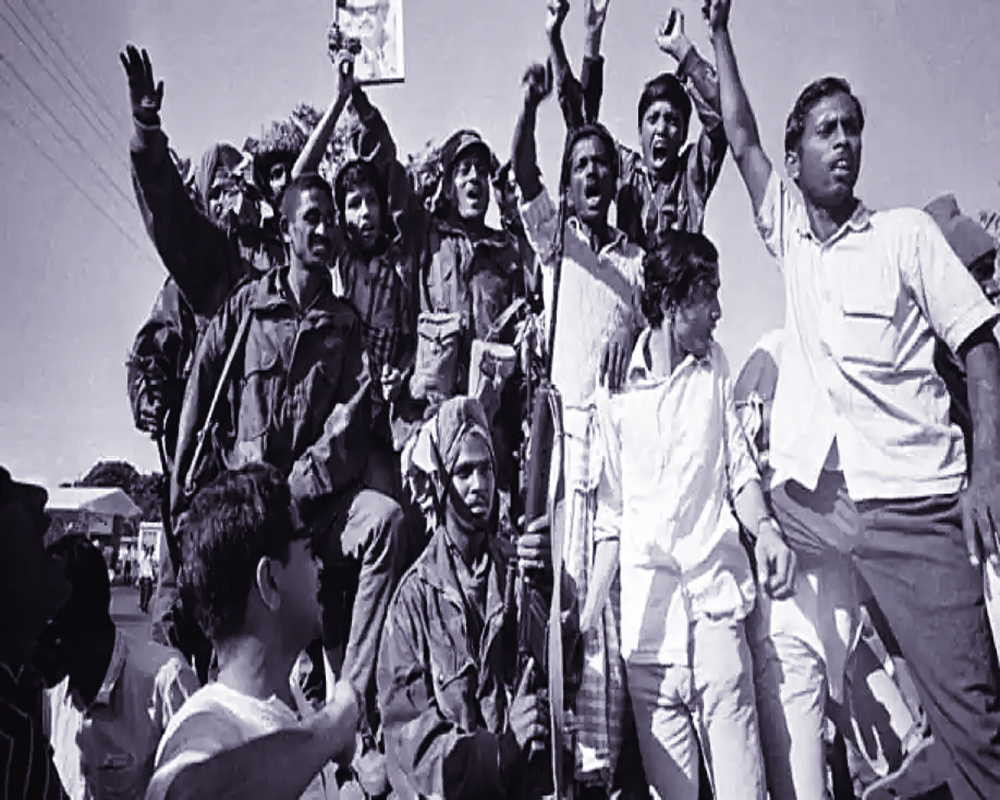The Bangladesh Liberation War was a turning point in history; the cause was supported by India after Pakistan unleashed intensified repression
The publication of Manash Ghosh’s book, Bangladesh War: Report from Ground Zero (Neogi), could not have been timed better — shortly before December 16, 1971, when the Pakistani military in what is now Bangladesh, surrendered to their Indian counterparts in Dhaka. Thus ended a war which had begun on December 3, 1971, with Pakistan attacking India, and which was one of the turning points in the history of the 20th century, which has seen several momentous developments.
The list is formidable. It includes World War I and II; the rise of Nazism and Fascism; the Bolshevik and Chinese revolutions; the emergence of weapons of mass destruction and the dropping of atom bombs on Hiroshima and Nagasaki; India’s Independence and the process of decolonisation that followed globally; the beginning, waxing and end of the Cold War; the rise of non-alignment as a global phenomenon; the dissolution of the Soviet Union and human forays into space and landing on moon.
The India-Pakistan war deserves to be in the list because India’s comprehensive victory led to the emergence of a new nation, Bangladesh, and the end of one of the most monstrous periods of repression in history, during which the Pakistani occupation regime and its military killed three million Bangladeshis and raped over 400,000 women, besides devastating vast stretches of the country.
The emergence of Bangladesh, about to celebrate 50 years of its existence, came as the culmination of developments that began immediately after the creation of Pakistan and stemmed from the sustained exploitation of the eastern wing, called East Bengal until 1955, when it was christened East Pakistan. Besides economic exploitation, there was a systematic effort to erase the eastern wing’s cultural and linguistic heritage and identity, and keep it in a state of political subjugation. The attempt to impose Urdu as the sole official language of Pakistan at the expense of Bengali led to the historic language movement, which turned the swelling anger of people in the direction of a liberation struggle spearheaded by the Awami League under the leadership of Sheikh Mujibur Rahman, who announced his historic six-point programme, outlining a far-reaching blueprint for autonomy and parliamentary democracy, on February 12, 1966.
The Government’s response was intensified repression. It arrested Rahman under the Public Safety Act in May 1967, and, in June 1968, initiated the Agartala Conspiracy Case against 35 people, including him, for conspiring to engineer East Pakistan’s secession from Pakistan with India’s help. A massive wave of public anger swept East Pakistan and assumed tidal proportions after a devastating cyclone hit the province’s southern coastline on November 11, 1970. One of the most severe natural disasters ever, it swept 500,000 people into the sea and caused widespread devastation and misery. The Government, slow in issuing warnings about the cyclone, deliberately dragged its feet in providing relief. Referring to the consequences, Ghosh writes: “Never in the recent history of liberation wars did a natural disaster trigger such a popular upheaval as it did in East Pakistan. The upheaval snowballed into Bangladesh’s Liberation War, leading to the breakup of Pakistan.”
Events moved towards a head after the elections to Pakistan’s National Parliament on December 7, 1970. The Awami League swept the polls in East Pakistan, winning 160 of the 162 seats for which elections were held, thus gaining an absolute majority in the 300-seat strong House. Zulfikar Ali Bhutto’s Pakistan People’s Party won 81 of the 138 seats in West Pakistan. As Rahman remained firm on the demand for autonomy and his right to form Government, and President Yahya Khan appeared accommodating as a ploy, Pakistan’s ruling junta, in alliance with Bhutto, planned a crackdown. Launched in the night of March 25, 1971, and codenamed ‘Operation Searchlight’, its sheer savagery, which has few parallels in history, led to resistance, which turned into a liberation war with India’s assistance. An incensed Pakistan attacked India on December 3, 1971. The rest is history.
Manash Ghosh’s book narrates, lucidly and coherently, the unfolding of the entire chain of events from the origins of the Bangladeshis’ alienation to the struggles leading to the crackdown, the liberation war waged by the Mukti Bahini, trained and equipped by India, Indira Gandhi’s efforts to mobilise global support against the Pakistani Government and military’s reign of terror that led to the arrival of 10 million refugees (nearly double the number, according to unofficial estimates) in India and, finally, the liberation of Bangladesh. Information ferreted out from sources and daring direct reportage from the ground, both during the pre-war period of resistance to Pakistani forces and the war, combine to portray in vivid detail a gory as well as heroic chapter of contemporary history. Some details in this unputdownable book are chilling. Ghosh cites Yahya Khan reminding Pakistan’s Dhaka commanders on the eve of the launch of ‘Operation Searchlight’ of what he had told them in February when the plan for it was being conceptualised: “At least three million Bengalis must die such a terrible and violent death that the rest of the population would be forced to eat out of our hands.”
Pakistan’s military did kill three million Bangladeshis but could not prevent the liberation of Bangladesh.
(The author is Consulting Editor, The Pioneer. The views expressed are personal.)


























